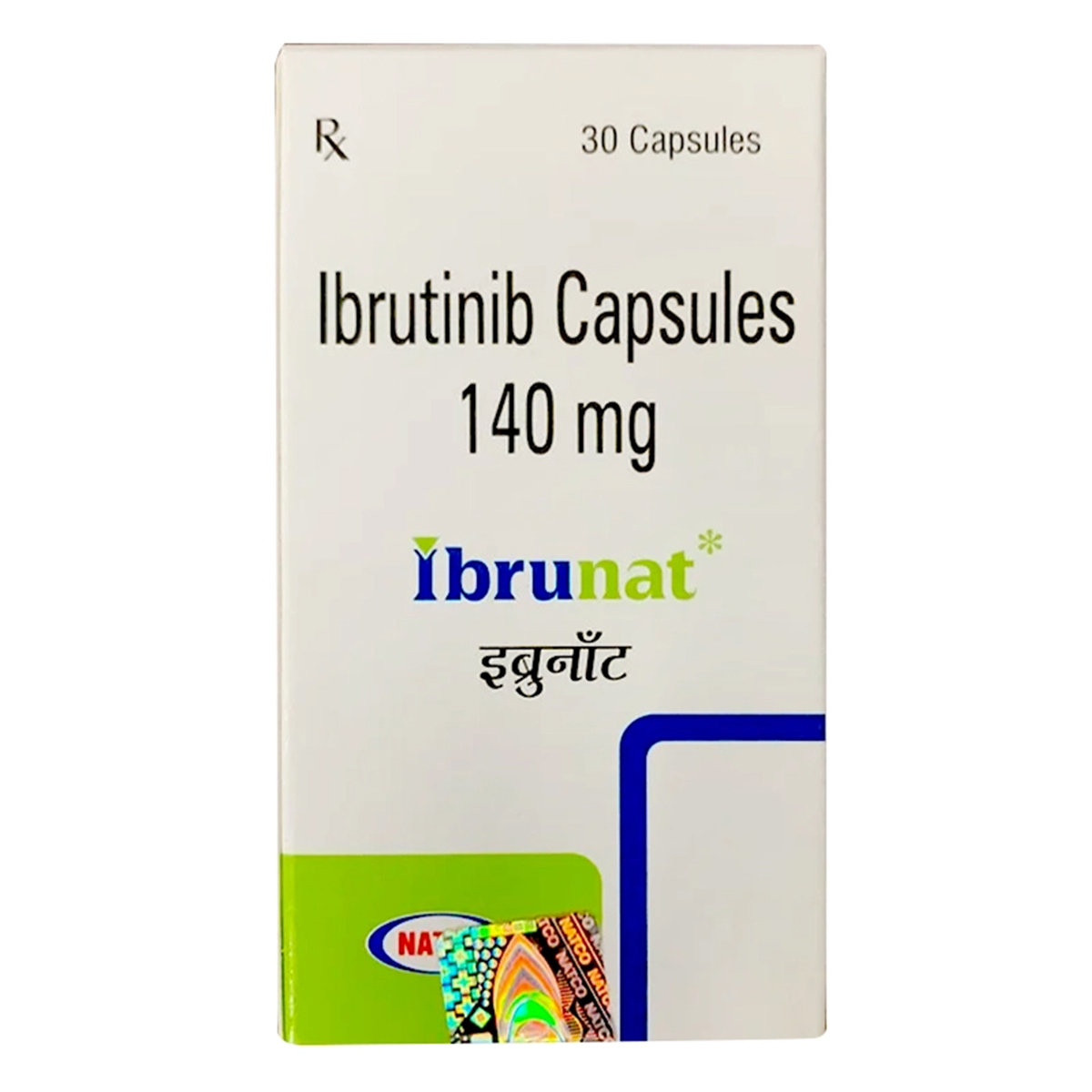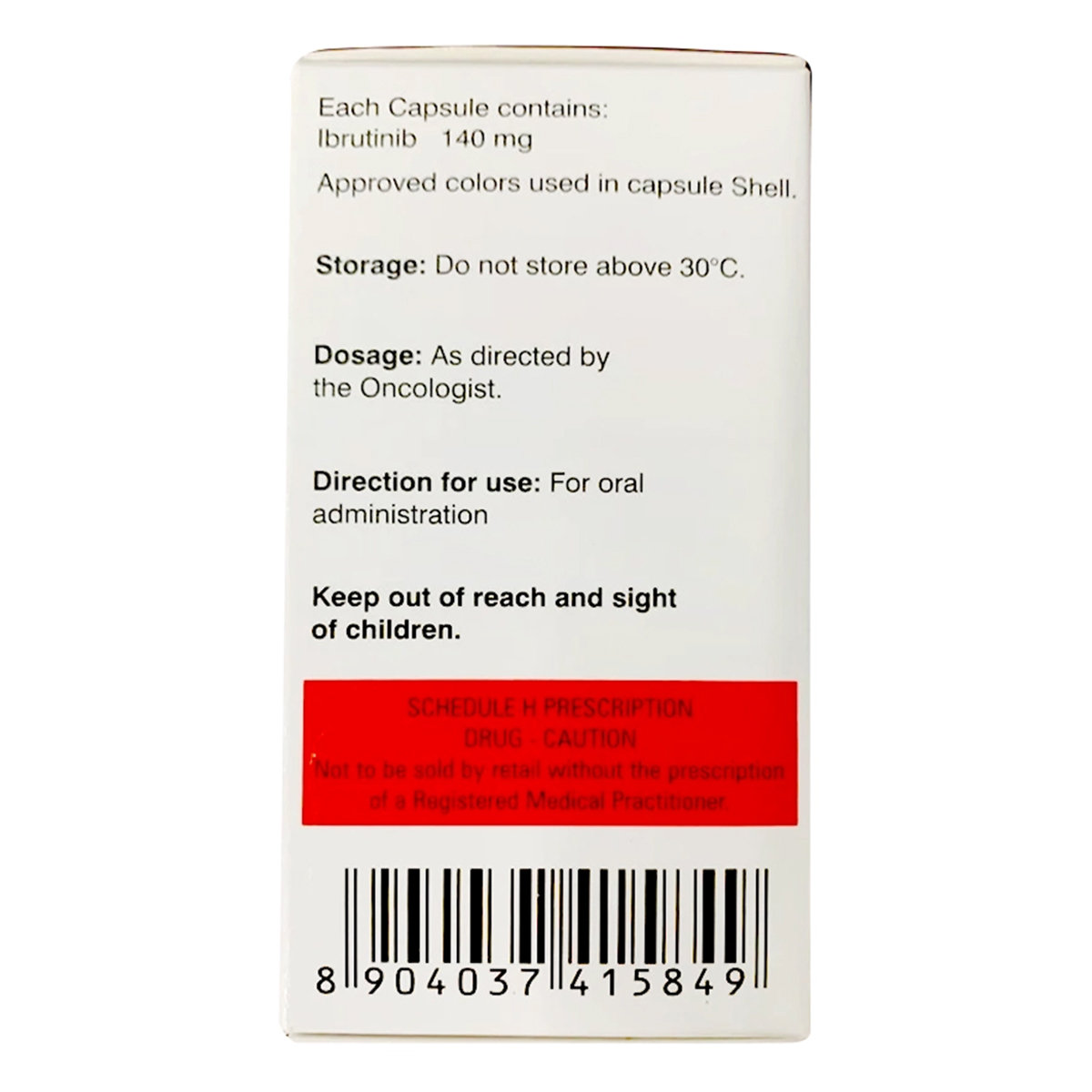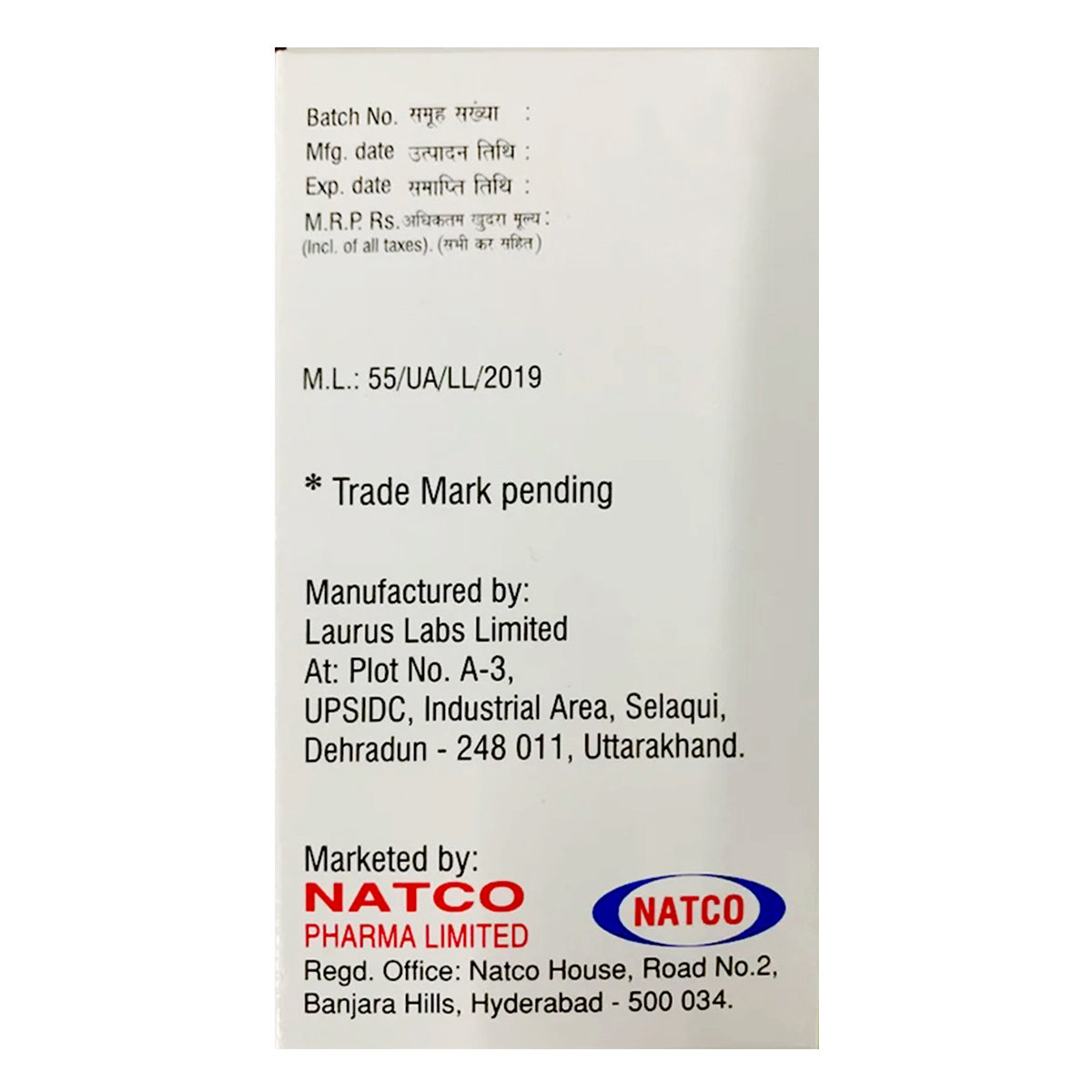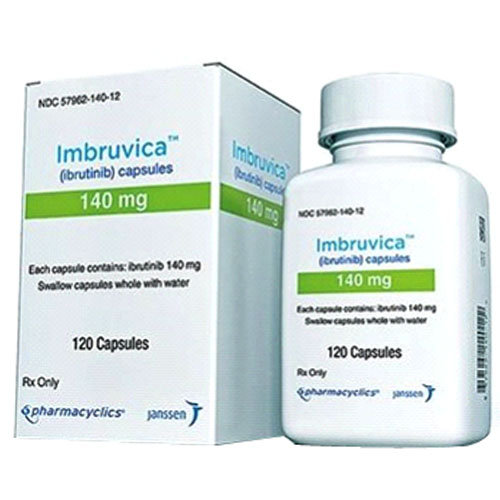Ibrunat Capsule 30's
MRP ₹8906
(Inclusive of all Taxes)
₹1335.9 Cashback (15%)
Provide Delivery Location
Online payment accepted
 Prescription drug
Prescription drugWhats That
Composition :
Manufacturer/Marketer :
Consume Type :
Expires on or after :
Return Policy :
About Ibrunat Capsule
Ibrunat Capsule belongs to the group of anti-cancer medicines called protein kinase inhibitors used to treat the following blood cancers in adults- mantle cell lymphoma (cancer affecting the lymph nodes), chronic lymphocytic leukaemia (cancer affecting white blood cells and lymph nodes), and waldenström's macroglobulinaemia (cancer affecting white blood cells).
Ibrunat Capsule contains Ibrutinib, which works by blocking Bruton's tyrosine kinase, a protein in the body that helps cancer cells grow and survive. Thereby, it kills and reduces the number of cancer cells. It also slows down the worsening of cancer.
In some cases, Ibrunat Capsule may cause side effects such as nausea, vomiting, diarrhoea, constipation, indigestion, and fatigue. Most of these side effects may not require medical attention and resolve gradually over time. Do not be reluctant to talk with your doctor if any of the side effects persist or worsen.
Do not take Ibrunat Capsule if you are pregnant or breastfeeding. Consult the doctor immediately if you become pregnant during treatment with Ibrunat Capsule . This medicine is not recommended for children as safety and effectiveness have not been established. Inform the doctor about your health condition and medications to rule out any side effects/interactions.
Uses of Ibrunat Capsule
Directions for Use
Key Benefits
Ibrunat Capsule belongs to the group of anti-cancer medicines called protein kinase inhibitors used to treat the following blood cancers in adults- mantle cell lymphoma, chronic lymphocytic leukaemia, and waldenström's macroglobulinaemia. This medicine may also be used to treat marginal zone lymphoma (cancer that begins in a type of white blood cells that normally fights infection) and chronic graft vs host disease (a complication of hematopoietic stem-cell transplant). Ibrunat Capsule contains Ibrutinib, which works by blocking Bruton's tyrosine kinase (a protein in the body that helps cancer cells grow and survive). Thereby, it kills and reduces the number of cancer cells. It also slows down the worsening of cancer.
Storage
- Inform your doctor about the medication you're taking and the UTI symptoms you're experiencing.
- Your doctor may adjust your medication regimen or consider alternative medications or dosages that may reduce the risk of UTIs.
- Drink plenty of water (at least 8-10 glasses a day) to help flush out bacteria. Avoid sugary drinks and caffeine, which can exacerbate UTI symptoms.
- Urinate when you feel the need rather than holding it in. This can help prevent bacterial growth and reduce the risk of UTIs.
- Consider cranberry supplements: Cranberry supplements may help prevent UTIs by preventing bacterial adhesion.
- Monitor UTI symptoms and report any changes to your doctor.
- If antibiotics are prescribed, take them as directed and complete the full course.
- Managing a low platelet count (thrombocytopenia) caused by medication usage requires a multi-step approach. Here are some steps to help manage the condition:
- Inform your doctor about your low platelet count and medication usage. They will assess the situation and guide the best course of action.
- Your doctor may recommend adjusting or stopping the medication that is causing a low platelet count. This could involve switching to alternative medication or reducing the dosage.
- Monitor your platelet count regularly through blood tests to track any changes. This will help the doctor determine the effectiveness of the treatment plan.
- If an underlying condition, such as infection or inflammation, contributes to the low platelet count, your doctor will treat it.
- In some cases, alternative treatments like platelet transfusions or medications that stimulate platelet production may be necessary.
- Avoid risky activities and certain medications; eat a balanced diet with plenty of water to reduce bleeding risk and boost overall health.
- If you experience severe bleeding or bruising, seek emergency medical attention immediately.
- Avoid taking raw fruits, nuts and vegetables.
- Do not share your personal things with others like toothbrushes.
- Clean the wounds and cuts using soap and water.
- Wash your hands thoroughly and frequently and maintain hygiene.
- Get a good quality of sleep.
- Include lean proteins like skinless poultry and fish.
- Choose whole grains and low-fat dairy products.
- Limit intake of fat and oil.
- Stay hydrated by drinking plenty of water.
- Restrict heavy sugar intake.
- Avoid red meat, processed foods, and refined sugar.
- Eat more fruits and vegetables.
- Stay hydrated by drinking plenty of water.
- Avoid rubbing your eyes, which can exacerbate the issue.
- Lubricate your eyes using artificial tears or eye drops.
- Wear sunglasses while you are out in the sun to protect your eyes from sun and wind.
- Avoid irritants like smoke, dust, and strong chemicals.
- Get enough rest and sleep to help your eyes recover.
Drug Warnings
Do not take Ibrunat Capsule if you are allergic to any of its components, if you are taking St. John's wort (herbal medicine) or if you are pregnant/breastfeeding. Inform the doctor if you have/had unusual bruising or bleeding, irregular heartbeat, heart failure, hepatitis B infection, liver problems, high blood pressure, kidney problems, or if you are due to undergo any surgery. Seek immediate medical attention if you experience symptoms of progressive multifocal leukoencephalopathy, a serious brain infection (trouble thinking, memory loss, sight loss, or difficulty walking), stroke (sudden confusion, numbness or weakness, trouble speaking, sight loss, loss of balance, or sudden severe headache), heart failure (breathlessness, difficulty breathing when lying down, weakness/tiredness, or swelling of the feet, ankles, or legs), rupture of the spleen (left abdominal pain, pain below the left rib cage or at the tip of left shoulder), infection (chills, fever, weakness, body aches, cold, flu symptoms, or confusion), or haemophagocytic lymphohistiocytosis, an inflammatory disorder (fever, bruising, swollen glands, or skin rash).
Drug-Drug Interactions
Drug-Drug Interactions
Login/Sign Up
Co-administration of Phenytoin and Ibrunat Capsule may decrease the blood levels of Ibrunat Capsule, which may make Ibrunat Capsule less effective.
How to manage the interaction:
Although taking Phenytoin and Ibrunat Capsule together can result in an interaction, it can be taken if a doctor has prescribed it. Do not discontinue any medications without a doctor's advice.
Taking Diltiazem with Ibrunat Capsule may increase the levels of Ibrunat Capsule.
How to manage the interaction:
Co-administration of Ibrunat Capsule with Diltiazem can result in an interaction, but it can be taken if a doctor has advised it. However, if you experience paleness, fatigue, dizziness, fainting, unusual bruising or bleeding, fever, chills, diarrhea, sore throat, muscle aches, breathing difficulty, blood in coughing fluid, red or inflamed skin, body sores, pain or burning during urination, nausea, vomiting, loss of hunger, increased or decreased urination, sudden weight gain or weight loss, fluid retention, swelling, irregular heart rhythm, consult a doctor. Do not discontinue any medications without a doctor's advice.
Taking Amprenavir with Ibrunat Capsule may increase the levels of Ibrunat Capsule. As a result, there may be an increased risk of side effects.
How to manage the interaction:
Although taking Ibrunat Capsule and Amprenavir together can cause an interaction, it can be taken if a doctor has suggested it. However, if you experience paleness, fatigue, dizziness, fainting, unusual bruising or bleeding, fever, chills, diarrhea, sore throat, muscle aches, breathing difficulty, blood in coughing fluid, red or inflamed skin, body sores, pain or burning during urination, loss of hunger, nausea, vomiting, increased or decreased urination, sudden weight gain or weight loss, fluid retention, swelling, shortness of breath, muscle cramps, tiredness, weakness, dizziness, confusion, and irregular heart rhythm, consult the doctor. Do not discontinue any medications without a doctor's advice.
Taking Clopidogrel with Ibrunat Capsule can increase the risk of bleeding.
How to manage the interaction:
Although there is an interaction between Clopidogrel and Ibrunat Capsule, they can be taken together if prescribed by a doctor. However, if you experience any feeling dizzy or lightheaded, red or black, sticky stools, severe headache, or weakness, consult a doctor immediately. Do not discontinue any medication without consulting a doctor.
When Ibrunat Capsule is taken with Fosphenytoin, it can cause the body to process Ibrunat Capsule faster. This can lead to poor treatment outcomes.
How to manage the interaction:
Taking Ibrunat Capsule with Fosphenytoin together can result in an interaction, but it can be taken if a doctor has advised it. Do not discontinue any medications without consulting a doctor.
When Ibrunat Capsule is taken with Infliximab, it can increase the risk or severity of developing serious infections.
How to manage the interaction:
Although taking Ibrunat Capsule and Infliximab together can cause an interaction, it can be taken if a doctor has suggested it. If you have any of these symptoms like fever, chills, diarrhea, sore throat, muscle aches, difficulty breathing, weight loss, or pain while urinating, contact a doctor immediately. Do not stop using any medications without talking to a doctor.
Taking Ibrunat Capsule with itraconazole may increase the levels of Ibrunat Capsule.
How to manage the interaction:
Although there is a possible interaction between Ibrunat Capsule and Itraconazole, they can be taken in case a doctor prescribes it. However, consult a doctor if you notice any of the following symptoms: paleness, tiredness, dizziness, fainting, unusual bruising or bleeding, fever, chills, diarrhoea, sore throat, aches in the muscles, shortness of breath, blood in the phlegm, red or irritated skin, body sores, or pain or burning when urinating, nausea, vomiting, loss of appetite, increased or decreased urination, sudden weight gain or weight loss, fluid retention, swelling, shortness of breath, muscle cramps, tiredness, weakness, dizziness, confusion, and irregular heart rhythm. Do not discontinue any medications without a doctor's advice.
Co-administration of Ibrunat Capsule with Epoprostenol can increase the risk of bleeding.
How to manage the interaction:
Taking Ibrunat Capsule with Epoprostenol together can result in an interaction, but it can be taken if a doctor has advised it. However, if you experience unusual bleeding or bruising, dizziness, lightheadedness, red or black, tarry stools, coughing up or vomiting fresh or dried blood that looks like coffee grounds, severe headache, and weakness, consult a doctor. Do not stop using any medications without a doctor's advice.
Co-administration of Ibrunat Capsule with Fingolimod can increase the risk of serious infections.
How to manage the interaction:
Taking Ibrunat Capsule with Fingolimod together can result in an interaction, but it can be taken if a doctor has advised it. However, if you experience fever, chills, diarrhea, sore throat, muscle pains, breathing difficulty, blood in your coughing fluid, weight loss, red or irritated skin, body sores, and discomfort or burning when you urinate, consult a doctor. Do not stop using any medications without a doctor's advice.
Co-administration of Ibrunat Capsule and Golimumab can increase the risk of developing serious infections.
How to manage the interaction:
Although there is an interaction, Ibrunat Capsule can be taken with Golimumab, if prescribed by the doctor. However, if you experience fever, chills, diarrhea, sore throat, muscle pains, breathing difficulty, blood in your coughing fluid, weight loss, red or irritated skin, body sores, and discomfort or burning when you urinate, consult a doctor. Do not discontinue any medications without a doctor's advice.
Drug-Food Interactions
Drug-Food Interactions
Login/Sign Up
Grapefruit Juice, Grapefruit, St. John’S Wort
How to manage the interaction:
Consumption of grape fruit or its products, St. John’S Wort during Ibrunat Capsule treatment may lead to an interaction. Avoid consumption of grape fruit or its products, St. John’S Wort while on therapy with Ibrunat Capsule.
Diet & Lifestyle Advise
- Eat a healthy diet and exercise regularly to maintain proper weight.
- Avoid smoking and alcohol consumption.
- Include vegetables and fruits in your diet.
- Avoid fast food, fried food, processed meats, refined carbs and added sugar.
- Get optimal sleep; rest well.
- Drink enough water.
Side Effects of Ibrunat Capsule
- Nausea
- Vomiting
- Diarrhoea
- Constipation
- Headache
- Fatigue
- Dizziness
- Mouth sores
Habit Forming
Therapeutic Class
All Substitutes & Brand Comparisons
RX
Out of StockImbruvica 140Mg Capsule 90'S
Johnson & Johnson Pvt Ltd
₹3644
(₹35.63 per unit)
85% CHEAPERRX
Out of StockBdbrut Capsule 30's
BDR Pharmaceuticals Internationals Pvt Ltd
₹7200
(₹196.8 per unit)
19% CHEAPERRX
Out of StockIB-Tib Capsule
Cadila Pharmaceuticals Ltd
₹7899
(₹215.91 per unit)
11% CHEAPER
Author Details
We provide you with authentic, trustworthy and relevant information
Drug-Diseases Interactions
Drug-Diseases Interactions
Login/Sign Up
FAQs
Special Advise
- Women of childbearing potential should use highly effective contraception during treatment and for three months after receiving the last dose.
- If you are due to undergo any surgery, including dental surgery, inform the doctor/dentist that you are on treatment with Ibrunat Capsule .
- Your doctor may recommend tests to check liver function.
- Drink plenty of water or other fluids while taking Ibrunat Capsule .
Disease/Condition Glossary
Mantle cell lymphoma (MCL): Mantle cell lymphoma is a type of cancer that affects the lymph nodes. Symptoms include swelling of lymph nodes, fever, night sweats, weight loss, fatigue, nausea, vomiting, pain, bloating, and indigestion.
Chronic lymphocytic leukaemia (CLL): Chronic lymphocytic leukaemia is a type of cancer affecting white blood cells called lymphocytes that also involves the lymph nodes. Symptoms include swollen lymph nodes, easy bruising, and fatigue.
Waldenström's macroglobulinaemia (WM): Waldenström's macroglobulinaemia is a type of cancer that affects white blood cells called lymphocytes. Symptoms include anaemia (lack of red blood cells), frequent infections due to lack of white blood cells, swelling of lymph nodes, pain and discomfort.

Have a query?
Alcohol
Safe if prescribed
It is not known if alcohol affects Ibrunat Capsule . However, avoid consumption of alcohol while on treatment with Ibrunat Capsule as it may worsen your condition.
Pregnancy
Consult your doctor
Ibrutinib belongs to pregnancy category D. Ibrunat Capsule should not be used during pregnancy. Use effective contraception and avoid pregnancy during treatment with Ibrunat Capsule .
Breast Feeding
Consult your doctor
Avoid breastfeeding while taking Ibrunat Capsule .
Driving
Safe if prescribed
Ibrunat Capsule may cause dizziness and tiredness. Do not drive or operate machinery if you experience any side effects that might lessen your ability to do so.
Liver
Consult your doctor
Avoid taking Ibrunat Capsule if you have moderate or severe baseline liver impairment. Dose adjustment may be needed in patients with mild liver impairment. If you have a history of liver disease, inform the doctor.
Kidney
Consult your doctor
If you have a history of kidney disease, inform your doctor before taking Ibrunat Capsule .
Children
Safe if prescribed
Ibrunat Capsule is not recommended for children as safety and effectiveness have not been established.












_0.jpg?tr=q-85)

